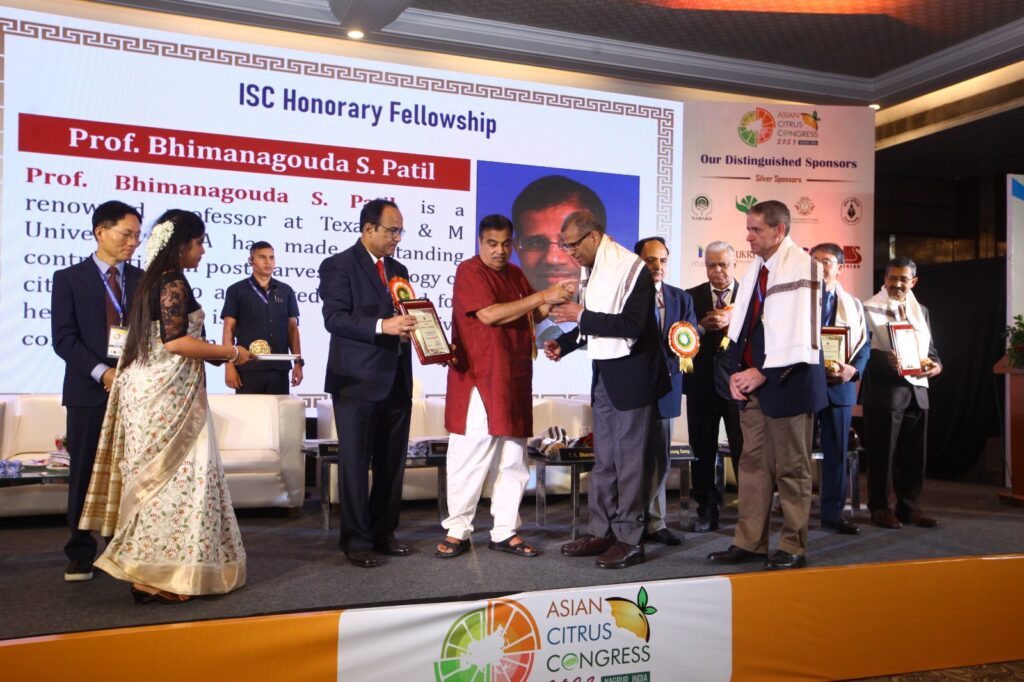World-renowned researcher named honorary fellow by Indian Society of Citriculture
Patil also distinguished panelist at inaugural Asian Citrus Congress-2023
The Indian Society of Citriculture has bestowed an honorary fellowship to Bhimu Patil, Ph.D., Texas A&M AgriLife Research professor in the Texas A&M College of Agriculture and Life Sciences Department of Horticultural Sciences. Patil is also director of the Vegetable and Fruit Improvement Center at Texas A&M University, College Station.
The accolade is awarded by scientific societies to individuals who have made exceptional contributions to research and academia, and the society recognized Patil for his “outstanding contribution in the advancement of citriculture.”
The honorary fellowship was conferred during the first presentation of the Asian Citrus Congress 2023 in Nagpur, India. The event was inaugurated by Nitin Gadkari, India’s minister of Road Transport, Highways and Shipping, New Delhi.

“The citrus industry is one of the most important horticultural sectors in Texas and many countries around the world,” said Amit Dhingra, Ph.D., head of the Department of Horticultural Sciences. “Dr. Patil is world-renowned for his work with citrus, especially the isolation and characterization of naturally occurring compounds in fruits and vegetables and their role in human health. He has dedicated his career to the advancement of foods for health, and I can think of no one more deserving of this honor.”
Patil’s citrus health benefits research know worldwide
Dilip Ghosh, Ph.D., president of the Indian Society of Citriculture and director of the Indian Council of Agricultural Research’s Central Citrus Research Institute, Nagpur, called Patil a true luminary in the world of citrus health benefits research.
“Dr. Patil’s exceptional accomplishments in unravelling the pre- and post-harvest effects of citrus on human health have not only enriched our understanding of this vital food source, they have also paved the way for healthier lives and reduced risks from chronic diseases.”
His groundbreaking work on limonoids, flavonoids and furocoumarins has led to innovative green technologies, including facilitating the discovery of significant novel compounds with the potential to transform microbiota research.
Patil has also received the Outstanding Research Award from the American Society for Horticultural Science and has been given the designation of Fellow by the American Chemical Society.
“I am deeply humbled and honored to receive this honor from the Indian Society of Horticulture,” Patil said. “This recognition is not just a testament to my dedication to the field of horticulture, but also a reaffirmation of the collective efforts of countless individuals and researchers who have contributed to our understanding of citrus fruits and their role in reducing the risk from chronic diseases.”
About the Asian Citrus Congress -2023
The event, themed “Advancing Citriculture for Agro-economic Prosperity,” was attended by more than 300 delegates from 16 countries.
The event provided at-length discussion of various aspects of citriculture in different Asian countries and provided an opportunity for participants to share their knowledge. To address the challenges and opportunities for Asian citrus, a special session CITRI Summit was organized at the congress to bring together industry professionals, processors, exporters, startups, researchers, policymakers and other stakeholders.
During CITRI, Patil served as a distinguished panelist, providing insight on the processing, bioprospecting and export of citrus fruits. He was also a plenary speaker at the summit.
“The summit offered a unique opportunity to share insights and innovations, bridging the gap between food and health and providing evidence-based health benefits of citrus,” Patil said. “I was excited to engage with fellow researchers, horticulturists, farmers, enthusiasts and others in exploring the frontiers of citrus science. This was a celebration of our shared passion for connecting pre- and post-harvest practices and their role in disease prevention.”





